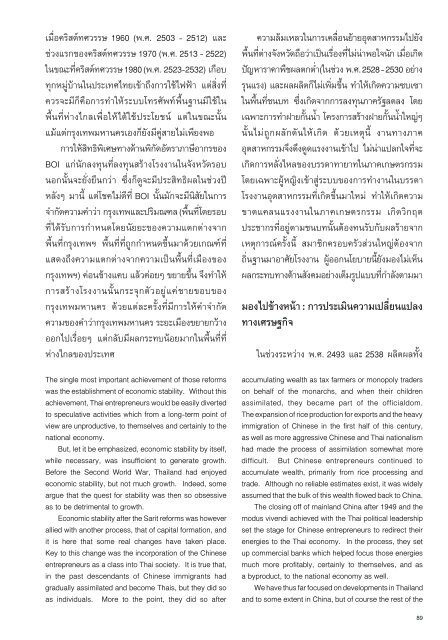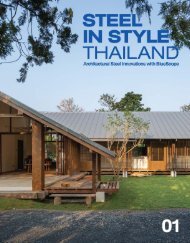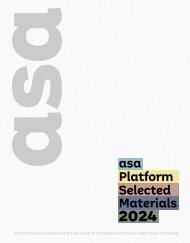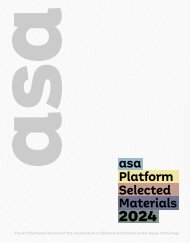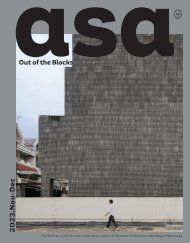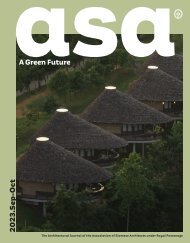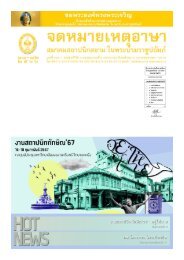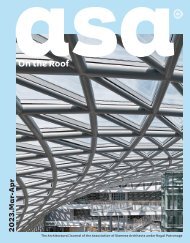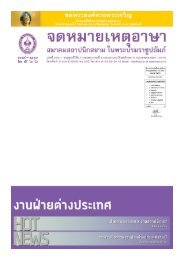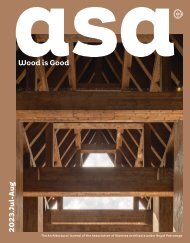บ้านเรือนถิ่นไทยในช่วงเจ็ดทศวรรษ 2489-2559
Create successful ePaper yourself
Turn your PDF publications into a flip-book with our unique Google optimized e-Paper software.
เมื่อคริสต์ทศวรรษ 1960 (พ.ศ. 2503 - 2512) และ<br />
ช่วงแรกของคริสต์ทศวรรษ 1970 (พ.ศ. 2513 - 2522)<br />
ในขณะที่คริสต์ทศวรรษ 1980 (พ.ศ. 2523-2532) เกือบ<br />
ทุกหมู่บ้านในประเทศไทยเข้าถึงการใช้ไฟฟ้า แต่สิ่งที่<br />
ควรจะมีก็คือการทำให้ระบบโทรศัพท์พื้นฐานมีใช้ใน<br />
พื้นที่ห่างไกลเพื่อให้ได้ใช้ประโยชน์ แต่ในขณะนั้น<br />
แม้แต่กรุงเทพมหานครเองก็ยังมีคู่สายไม่เพียงพอ<br />
การให้สิทธิพิเศษทางด้านพิกัดอัตราภาษีอากรของ<br />
BOI แก่นักลงทุนที่ลงทุนสร้างโรงงานในจังหวัดรอบ<br />
นอกนั้นจะยั่งยืนกว่า ซึ ่งก็ดูจะมีประสิทธิผลในช่วงปี<br />
หลังๆ มานี้ แต่โชคไม่ดีที่ BOI นั้นมักจะมีนิสัยในการ<br />
จำกัดความคำว่า กรุงเทพและปริมณฑล (พื้นที่โดยรอบ<br />
ที่ได้รับการกำหนดโดยนัยยะของความแตกต่างจาก<br />
พื้นที่กรุงเทพฯ พื้นที่ที่ถูกกำหนดขึ้นมาด้วยเกณฑ์ที่<br />
แสดงถึงความแตกต่างจากความเป็นพื้นที่เมืองของ<br />
กรุงเทพฯ) ค่อนข้างแคบ แล้วค่อยๆ ขยายขึ้น จึงทำให้<br />
การสร้างโรงงานนั้นกระจุกตัวอยู่แค่ชายขอบของ<br />
กรุงเทพมหานคร ด้วยแต่ละครั้งที่มีการให้คำจำกัด<br />
ความของคำว่ากรุงเทพมหานคร ระยะเมืองขยายกว้าง<br />
ออกไปเรื่อยๆ แต่กลับมีผลกระทบน้อยมากในพื้นที่ที่<br />
ห่างไกลของประเทศ<br />
The single most important achievement of those reforms<br />
was the establishment of economic stability. Without this<br />
achievement, Thai entrepreneurs would be easily diverted<br />
to speculative activities which from a long-term point of<br />
view are unproductive, to themselves and certainly to the<br />
national economy.<br />
But, let it be emphasized, economic stability by itself,<br />
while necessary, was insufficient to generate growth.<br />
Before the Second World War, Thailand had enjoyed<br />
economic stability, but not much growth. Indeed, some<br />
argue that the quest for stability was then so obsessive<br />
as to be detrimental to growth.<br />
Economic stability after the Sarit reforms was however<br />
allied with another process, that of capital formation, and<br />
it is here that some real changes have taken place.<br />
Key to this change was the incorporation of the Chinese<br />
entrepreneurs as a class into Thai society. It is true that,<br />
in the past descendants of Chinese immigrants had<br />
gradually assimilated and become Thais, but they did so<br />
as individuals. More to the point, they did so after<br />
ความล้มเหลวในการเคลื่อนย้ายอุตสาหกรรมไปยัง<br />
พื้นที่ต่างจังหวัดถือว่าเป็นเรื่องที่ไม่น่าพอใจนัก เมื่อเกิด<br />
ปัญหาราคาพืชผลตกต่ำ(ในช่วง พ.ศ. 2528 - 2530 อย่าง<br />
รุนแรง) และผลผลิตก็ไม่เพิ่มขึ้น ท ำให้เกิดความซบเซา<br />
ในพื้นที่ชนบท ซึ่งเกิดจากการลงทุนภาครัฐลดลง โดย<br />
เฉพาะการทำฝายกั้นน้ำ โครงการสร้างฝายกั้นน้ำใหญ่ๆ<br />
นั้นไม่ถูกผลักดันให้เกิด ด้วยเหตุนี้ งานทางภาค<br />
อุตสาหกรรมจึงดึงดูดแรงงานเข้าไป ไม่น่าแปลกใจที่จะ<br />
เกิดการหลั่งไหลของบรรดาทายาทในภาคเกษตรกรรม<br />
โดยเฉพาะผู้หญิงเข้าสู่ระบบของการทำงานในบรรดา<br />
โรงงานอุตสาหกรรมที่เกิดขึ้นมาใหม่ ทำให้เกิดความ<br />
ขาดแคลนแรงงานในภาคเกษตรกรรม เกิดวิกฤต<br />
ประชากรที่อยู่ตามชนบทนั้นต้องทนรับกับผลร้ายจาก<br />
เหตุการณ์ครั้งนี้ สมาชิกครอบครัวส่วนใหญ่ต้องจาก<br />
ถิ่นฐานมาอาศัยโรงงาน ผู้ออกนโยบายนี้ยังมองไม่เห็น<br />
ผลกระทบทางด้านสังคมอย่างเต็มรูปแบบที่ก ำลังตามมา<br />
มองไปข้างหน้า : การประเมินความเปลี่ยนแปลง<br />
ทางเศรษฐกิจ<br />
ในช่วงระหว่าง พ.ศ. 2493 และ 2538 ผลิตผลทั้ง<br />
accumulating wealth as tax farmers or monopoly traders<br />
on behalf of the monarchs, and when their children<br />
assimilated, they became part of the officialdom.<br />
The expansion of rice production for exports and the heavy<br />
immigration of Chinese in the first half of this century,<br />
as well as more aggressive Chinese and Thai nationalism<br />
had made the process of assimilation somewhat more<br />
difficult. But Chinese entrepreneurs continued to<br />
accumulate wealth, primarily from rice processing and<br />
trade. Although no reliable estimates exist, it was widely<br />
assumed that the bulk of this wealth flowed back to China.<br />
The closing off of mainland China after 1949 and the<br />
modus vivendi achieved with the Thai political leadership<br />
set the stage for Chinese entrepreneurs to redirect their<br />
energies to the Thai economy. In the process, they set<br />
up commercial banks which helped focus those energies<br />
much more profitably, certainly to themselves, and as<br />
a byproduct, to the national economy as well.<br />
We have thus far focused on developments in Thailand<br />
and to some extent in China, but of course the rest of the<br />
89


